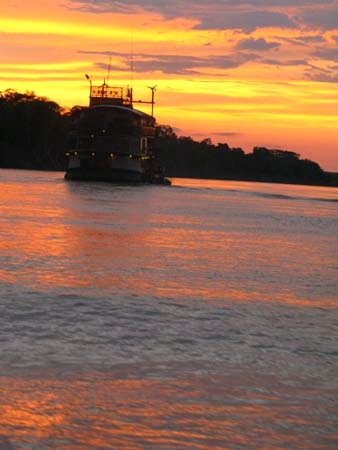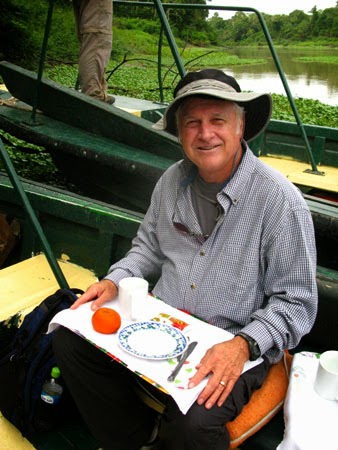“I never thought I’d be
cold in the Amazon,” my husband quips as he buttons up his long-sleeved shirt.
It’s August, but cool breezes keep us comfortable as our guide motors the skiff
we’re riding in towards a tributary of the
Amazon River. The weather is just
one of the pleasant surprises during our week-long adventure with tour company
International Expeditions.
 |
| Clear reflections on an Amazon tributary |
We’re on an early
morning excursion traveling up river from where our floating hotel, on the
24-passenger La Amatista, is anchored. Along with 13 other people and two guides,
my husband and I will travel 65 miles this day deep into the protected
Pacaya-Samiria National Reserve, the largest protected wetland reserve in the
world.
 |
| La Amatista, our ship, at sunset |
The headwaters of the
Amazon originate from glaciers high in the
Andes Mountains, and the section
through which we’ll travel is entirely in Peru. From there, the river flows
eastward for more than 4,000 miles before spreading across miles and surging
into the Atlantic Ocean in Brazil. Not just one river, the Amazon includes more
than 1,100 tributaries, 17 of which are over 1,000 miles long. The immensity of
this river system, largest in the world, is truly hard to comprehend.
 |
| Riberenos fishing in the Amazon |
During our first full
day on the river our ship splits off from the main channel to a course on one
of the largest tributaries, the 300-mile
Ucayali River. From there, we board
the skiff which cuts cleanly through chocolate-colored water, passing
riberenos--river people--trolling from handmade canoes and farming rice on
muddy river ledges. Fishermen on flat rafts float down river to Iquitos, a
six-day journey, with net enclosures full of catfish they will sell in the
city.
 |
| Birds including parrots make their home in the rainforest. |
We soon discover why
this is a bird-watchers paradise. Thousands of species live in the protected
canopy of the rain forest. Several people on our tour really know their stuff
and identify dozens of birds including snowy egrets, puffins, king birds, great
black hawks, white-winged swallows, terns, and more. To me the birds are simply
“the brown one” or “the yellow-beaked one.” We’re amused when Johnny, one of
our native guides, excitedly exclaims, “Oh my god, I think I’m going to die!”
as he spies a rare bird species.
 |
| Sunset on the Amazon River |
Twice a day naturalist
guides take guests on excursions to visit local villages, swim in the Amazon,
search for wildlife, fish for piranhas, or trek in the jungle. Even though
we’re in a primitive area we’re not really roughing it. The crew provides daily
meals and laundry service as well as nightly entertainment. The observation
deck is a fine place to relax and visit with other guests as we take in
stunning scenery of this great wilderness region.
 |
| Our crew entertained us with Peruvian music. |
 |
| Breakfast onboard the skiff |
One morning we leave
early on a sunrise cruise. When the skiffs come to a section of flat water the
guides serve a full breakfast in style on china plates and lace placemats.
Above us on the bank, graceful blue and yellow macaws provide an unforgettable show
as they flit from tree to tree in a mating ritual.
In the afternoon we
travel back into the Reserve on the Pacaya River, a branch off the Ucayali.
Sustainable living practices—hunting and fishing for personal use—are allowed
for the thousands of people who live in and around the Reserve, mostly in
small, isolated communities. These riberenos live as their ancestors did, unaffected
by modern lifestyles.
Photos by Larry and Beverly Burmeier







I did an Amazon trip in Ecuador and your post brought back great memories! The Amazon is so awesome!
ReplyDeleteWhat an amazing adventure. Love that naturalist guides lead you on excursions and the musical entertainment is such a fun touch. Great post :)
ReplyDelete